Indigenous Sport Month: Matilda Kyah Simon opens up on family, responsibilities and the future
Kyah Simon struggled to marry up the two sides of her Indigenous background — but is eternally grateful for her parents’ efforts to set her on the path to become a Matildas great.
Women's sport
Don't miss out on the headlines from Women's sport. Followed categories will be added to My News.
Growing up Kyah Simon was all too aware of the pitfalls that can swallow up the futures of young Indigenous children.
Her father, Gordon, had harrowing tales his own parents’ alcoholism and domestic violence, with wife Pam desperately wanted a different life for his children.
It’s why when Simon speaks of the inspiration which put her on a path to becoming the first Indigenous Australian to score a goal in a World Cup, family sits right alongside Cathy Freeman as the role models she has carried with her on her remarkable journey.
Simon recognises the sacrifices and the challenges her parents made to help her scale the heights of world football – efforts which have not only pushed the striker to reach the top of her field, but have left her determined to do the same for Indigenous athletes of the future.
She speaks to JOE BARTON about the responsibility of being a modern Indigenous athlete, what can be done to clear the path for future generations and how she’s endeavoured to make her family proud.
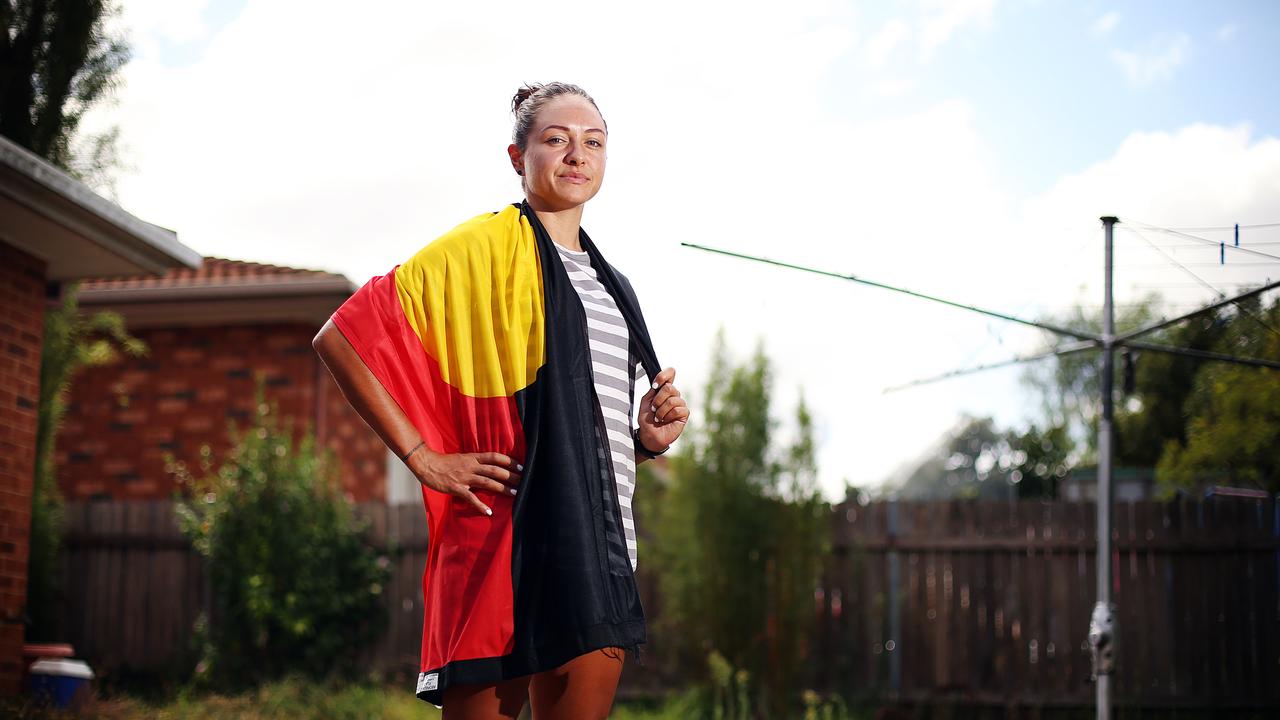
What Indigenous nations are you connected with?
Anaiwan is Armidale and Biripi is Taree.
What does heritage/culture mean?
Obviously it’s really special and something close to my heart. It’s where we come from, there’s such a rich history and culture in our Indigenous history – the longest-standing culture in history. There’s been a lot of things and challenges that people in my family have had to deal with and go through for me to be in the position I’m in now, and to give me the life I’m living. It’s something I cherish and hold really close to my heart. I think that’s why, when I do represent myself and my family I’m always thinking like that, in the back of my mind, it’s a way for me to give back and show my appreciation for the people that have been through a lot to give me the life I live today.
Growing up were you made aware of your heritage?
It definitely was. It was difficult because my parents always wanted to give us kids a different path than the path they had been given. It was a matter of knowing who you are, knowing your background and being confident, but also knowing the stereotypical pathways that Aboriginal kids are shown with alcoholism and domestic violence – they really wanted to take us away from that life and I guess there was a bit of a divide between being proud of who you are, where you come from and our history, but also that we don’t want to succumb to the stereotypes that surround a lot of our people. Family means a lot to me – they’re that common denominator that are there through good and bad times. They’re the centrepiece of who I am.
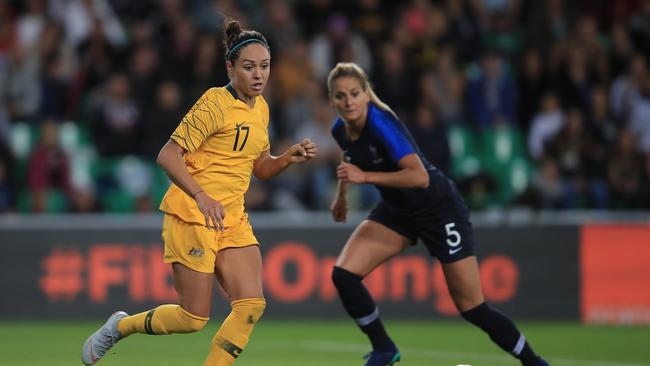
What advice would you give a teenage Kyah Simon?
There’s going to be challenges along the road and obstacles you’ll face throughout your journey, but to just be resilient and stay strong – because there’s going to be ups and downs, but as long you keep pushing on, chase your dreams and follow your goals, you’ll get there and make your family proud.
How do you react when you cop abuse?
No one likes to cop abuse in any form, verbally, emotionally, racially or non-racially. Everyone has to be respected equally. I just don’t think there’s any room for it in society and it needs to be eradicated as best as we can. We have a responsibility to do that as individuals to stamp it out where we can and stand up for each other and stand up for the rights for everyone to be treated equal.
Who was your sporting hero?
Growing up, Cathy Freeman’s story really resonated with me. She was someone I could look at and see little bits of myself in, because had the same skin colour, shared the same background and she was another Indigenous sporting hero that I could really look up to. I was nine in 2000, and remember sitting in my lounge room watching her win gold with my family. The Olympics was going on but really it didn’t start until she ran that race. I love watching the athletes at the Olympics, and Cathy lighting the cauldron set it up for the amazing, fairytale ending. And she didn’t disappoint. In a football sense, David Beckham was my role model. I just loved everything about him and he made me fall in love with the game.
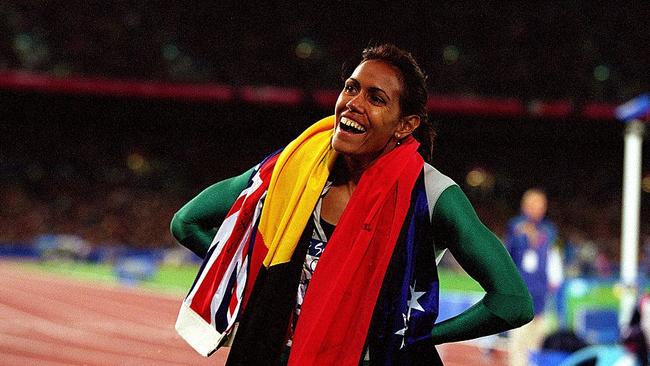
What is it like being an Indigenous athlete in 2021?
It’s a privilege for me. There’s 52 Indigenous Olympians to date, there will be 53 in Tokyo with boxer Alex Winwood. I hope as we look down the track in 10, or 20 years time that number has tripled. We’re in a really unique position at the moment to inspire that next generation coming through. Being in a position where sport, and female sport, is more visible and more accessible for kids and Indigenous youth, they can see it and be inspired and have role models similar to what Cathy was for me. It’s my wish and hope that down the track we can look back and say that we did make a change and difference and see so many more Indigenous athletes doing great things on the world stage in many different sports. I feel we have a really powerful responsibility right now as current athletes who are representing our country. If we can keep that moving in a positive direction and a positive light, it will do wonders for future generations coming through.
It sounds like that’s a responsibility you’re embracing?
It’s always been a responsibility I’ve taken on, being a role model for youth in Australia but also all around the world with football being a world game, it’s something I’ve always taken pride in doing and making sure I am representing myself in a respectful way and being a positive role model for young kids to look up to, and hopefully draw inspiration from, so they can be in my shoes one day when they get a little bit older.
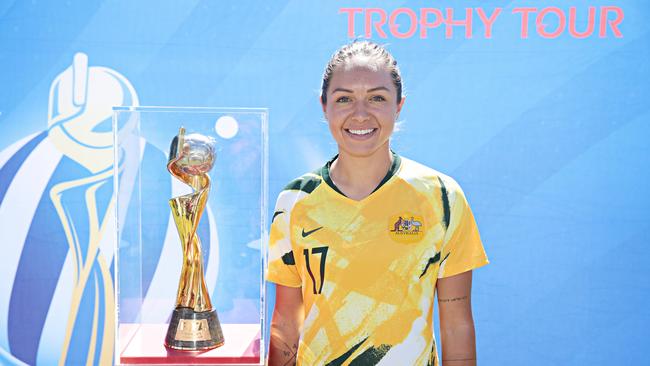
Have you encountered racism or unconscious bias in your career?
Definitely, whether it be if people are a little bit more influenced by their environment or home situation with opinions and things they might hear, or a lack of understanding of what racism is. I definitely experienced that from teammates, through jokes, when I was younger rather than now. But anything directly? No. When you get a bit older you surround yourself with the right people, and protect your inner peace a little bit and remove yourself from situations that could expose you to those issues. I haven’t experienced really any of it through social media and stuff which is great for me, but I know a lot of Indigenous athletes that have been targeted like that, so that not to say it’s not happening.
Who set you on the path to being a Matilda?
Obviously my family first and foremost – mum and dad and my three siblings were willing to support me and the path I chose from the get go. It was definitely going to be a sporting path, because we’re a sporting family, and my parents put us kids into as many sports as you could name from a young age. And it was our next door neighbours, the Loudon family, that actually introduced me to football. I was best friends with both of their sons, Mark was my sister’s age – 18 months older – and Michael was my age, and they said ‘come down to soccer’ because I was playing rugby league at the time. It was a sport with my best mates, so I had no hesitation to go down and do it. And I was a bit of a hyperactive child, so my parents jumped at the opportunity to put me into another sport to exert my energy. And then I met a lot of other guys my age that were playing football, and one of my first coaches was David Saliba, who definitely helped putting me on the right path.
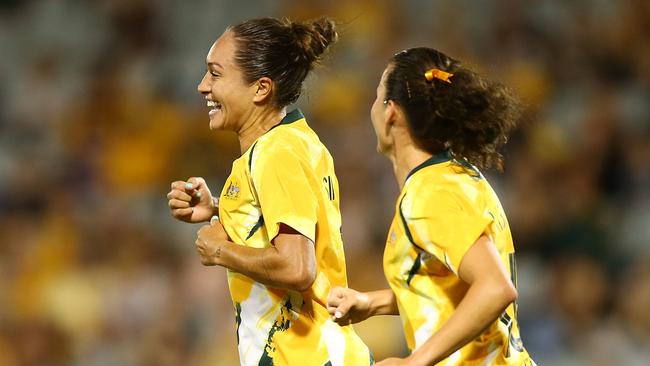
Who is your inspiration?
From a young age, it was Cathy, who inspired me to want to represent Australia and seeing her at the Olympics really inspired me to want to be an Olympian myself one day. Carrying that through my journey has really pushed me in the right direction to continue to follow my dreams. I can’t leave out my family, who inspire me with their own challenges and continue to do that to this day which is really special for me.
How do we improve support networks for Indigenous athletes coming through?
I’m working closely with Football Australia at the moment to be more culturally confident in that space. There’s good plans in place for the future of our game and to get more Indigenous kids involved in football. Because a lot of the time that’s the free ticket out – and it gives you so many values and morals that you can translate into everyday life. It’s really important for the future of the game. In terms of personal experience, having an Indigenous round in the W-League and A-League is really special, as is having a Welcome to Country and acknowledgment of the country happening in any game that the national teams play on home soil. Knowing that culturally people are sound and aware and have that knowledge, which I know Football Australia are going through at the moment, is really pleasing and I’m happy to be a part of that. There’s a lot of things I’m working with Football Australia and (Head of Women’s Football) Sarah Walsh on.
Is there a way we can improve the pathway for leadership roles?
You have to have more of a culturally sound organisation for an Indigenous person to step into a role and feel comfortable, welcomed and supported, to be vocal and express how they feel about that space and be proud of who they are. I think that’s a really key component to having more Indigenous people involved in those managerial roles and higher positions. It all comes down to the core of making sure no matter what the organisation is, that they’re culturally sound and have a genuine interest to learn about and be accepting of our history. It can be confronting, but I think when we get to a place where we accept that’s our history, and we’re proud of it, but we’re all working to move forward and have that accepting culture and society – then you will find more Indigenous people are inclined to go into big organisations and not be afraid to step outside of their comfort zone, knowing that they’re supported by other people they’ll be surrounded by.





